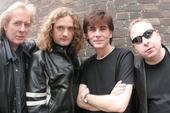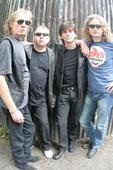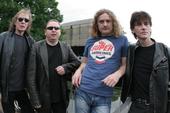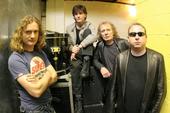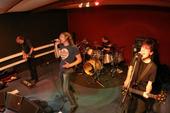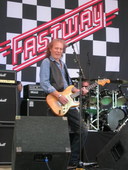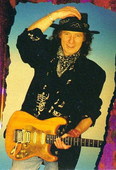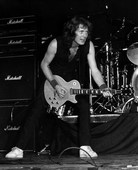Fastway
Back In The Saddle
04.07.2012
Архив интервью | Русская версияFast Eddie Clarke is a true rock legend, there’s no doubt about it. Even if he had quit music back in 1982, he would still remain famous. There can be no other way when you’re talking about the man who recorded guitar for such Motorhead songs as “Overkill”, “Ace Of Spades” or “Bomber”. However Eddie did not want to be a retired legend and put together his own band Fastway. After experiencing a lot of trials and tribulations, the band fell apart in 1990. But now Fastway are back with a new line-up and a new album called “Eat Dog Eat”, and Eddie has a lot of interesting stories to share...
Fastway reformed back in 2007 but you’re releasing a new album only now. Why did it take so much time?
With these things, nothing ever goes smoothly. Toby (Jepson, singer) and I started to write the album in 2008 after we did Sweden Rock. It was to be a Fastway album, but the bass player, John McManus, had some personal problems that he needed to attend to, so he actually quit the band at that time. And Steve Strange, the drummer and the agent who was putting all the shows together, is Coldplay’s agent, so he had to go to Australia and sort stuff out over there. Things just started to fall apart. Toby and I have written the songs for this record by the end of summer 2008, but Toby was offered a short-term job in the USA, and he needed to work, he’s got a family and everything. He went off to the USA, and when he came back from the USA, he started working with a band called Gun, they’re a Scottish outfit. I wasn’t that happy when he went off to the States, because I felt we had a good album here. But things had stopped happening with Steve away and John not in the band anymore, things were looking a bit unproductive, let’s say.
Anyway, 2009 passed off, I spent time doing a little blues thing with a keyboard player called Bill Sharpe from Shakatak. He’s a jazz player really, but we did a blues thing. It was quite nice, we did about seven songs together, it was just something to do for me, just to keep my hand in. In about March 2010 I got a phone call from Steve Strange the agent, who said, “Let’s try and do some more Fastway shows”. I said, “Fine, let’s do what can be done”. We had a few rehearsals, John was the bass player, Steve was the drummer, and Toby was the singer, although things weren’t really going according to plan. But at the same I asked Toby if I could use some of the material we’d written in 2008 on my blues album, particularly “Love I Need”, track 9 on the album now. He said, “Yeah, no problem, and if you like, I’ll sing it”. I said fine, because I didn’t have any singers in mind for the blues project.
The Fastway thing didn’t happen, we only had one show, which was cancelled. And the rehearsals weren’t going off too well, people just had too much stuff going on. I went away and listened to the material that Toby and I had written, for the first time since 2008, and I realized that there was a lot of good material there, in fact, enough for a whole album. I asked Toby out and I said, “Look, Tob, we’ve got an album here. I’d like to do a Fastway album with you singing and producing”. I had a drummer friend called Mac Eldridge, I said, “Mac can play the drums, we could use your engineer, and I’ll pay for it all”. He loved the idea, and the next thing we were doing was organizing the studios, trying to see how much it would cost and who was available. We ended up rehearsing with the drummer in early September down in Portsmuth for three weeks, just to get the songs sounding like a band, because we wanted it to be a band sound, we didn’t want to just be recording it, it had to be a live band sound. So we spent three weeks rehearsing, and it all worked out really well, the songs were sounding great, in fact, they were getting better and better with every rehearsal. Then we went out to Chapel Studios in Lincolnshire for three weeks to lay down the backing tracks, which went really well. We set up in an old chapel, so it’s a sound of a band playing in the chapel, all the backing tracks were recorded live in the studio. I think we got a really nice live band sound. Then we had a couple of weeks off, which took us into October, and we went back to the studio and mixed it all.
By the end of October 2010 we had a finished album. But of course, then we had to get someone to put the record out, and it has taken since then to secure a deal with SPV. And as you know, they’re brining the album out on November 14.
How did you get to know Toby Jepson? Did you try to connect with Dave King or anybody else from the original line-up?
When we were putting the original band back together in 2007, we had a guy from Ireland singing with us, a guy called Harv Harbinson from Stormzone, who was going to do the vocals just as a sort of favor. He’s a very good friend of Steve, the agent, and he was just going to help out. But we realized that we needed to do quite a bit of rehearsing, and as Harv lived in Northern Ireland, it wasn’t a viable proposition for him to be in the band. So Steve Strange, who happens to know everybody, said, “There’s this friend of mine, Toby Jepson, who used to sing with Little Angels. Why don’t we try him now?” I said, “Yeah, fine if you think he’s worth it”. Toby came down to the rehearsal, and to be honest with you, I hit it off with Toby straight away. He’s a true professional, he works very hard, we had a great working relationship, and actually 2007 went off really well.
As for Dave King, Dave and I don’t have any contact, we haven’t had for 20 years now. There’s no love lost between us, he’s one of those singers that… I dislike many singers, Toby is an exception to that. So Dave and I don’t really have any contact anymore.
How did you get signed with SPV Records? Did you know the label boss Olly Hahn in the past or were you just going round shopping for a deal?
Actually I got a call in January. At the end of October, the winter came in, we went for a severe winter in England, and one thing after another, Christmas and everything, so I didn’t do an awful lot. And in January I got a call from a friend of mine called Steve Hammond, he used to work and he still works at Sanctuary. They had all the Motorhead stuff, which is now with Universal, and he used to put all the compilations together. And he’s a sort of troubleshooter for record labels. So he called me out of the blue and said, “I hear you’ve got a new record. I’ve got someone who’s interested, can you send me a few tracks?” I said “sure”, so I sent him a few tracks – “Freedom Song”, “On And On” and “Deliver Me”. He got back to me and said, “Yeah, they liked the tracks, what would you like to do for a deal?” This was now February, and I said, “Well, I’m not sure. Would you like to hear some more music?” It all went very quiet, they had this MIDEM thing down in the south of France. He contacted me again in April and said, “The label which is interested is SPV”. I said, “Oh, I thought SPV were bankrupt”. They used to have Motorhead and Saxon and many other bands, and then I heard through the grapevine that they encountered financial difficulties. He said, “No no, they’re a small unit now, they turned down their operation”. And I thought to myself, “This is good for us!” The only label that you want to be with in my position is the one that is working hard to survive, because that means they work hard on your behalf. I checked to see if they were a viable proposition, I spoke to some friends of mine in the business, and everybody said, “They’re great people, Olly is a great man”. But these things take so much time! That was April, and we had a lunch with their English representative in June, and it was only about six weeks ago that I signed the deal. You can imagine that I was getting scared a little bit, I felt that it’s never gonna happen! (laughs) Fortunately it has, and the record is coming out November 14. I’m very happy, and I think we’re gonna have a good working relationship between SPV and Fastway.
Everybody knows what the expression “dog eat dog” means but what is the meaning of the title “Eat Dog Eat”?
It’s kind of reverse of “dog eat dog”. I mean “Dog eat dog” is a nasty saying really, it’s like “nobody cares about anyone else”. What we were trying to tell… Toby actually came up with it, we had it on the wall in the studio, we had about 10 different titles on the wall, all those funny names. “Eat Dog Eat” was up there, and it just started to stick out from all the others. I said to Toby, “What did you mean by it?” He said, “Not sure really”. It’s - as you said - the opposite of “dog eat dog”, and it’s said to be more human than “dog eat dog”, the other side of the coin, the other side of the tracks, when you’re down and out… It has something to do with it, but you’d have to really ask Toby, because these are the things he said - he’s the singer, he writes lyrics. (laughs) All of these things are going on in his head, none of these things is going on in my head, I just play guitar. He has all these things around his head, all the words, big meanings and stuff.
With Toby becoming a singer of Dio Disciples, what are the future steps for Fastway?
We’ve got everything on the boil at the moment. Obviously it’s gonna be the question of how the record does before we could actually decide whether we will be doing a tour in Europe, but in the meantime I’ve spoken to my agent friend Steve Strange, and he’s booking us as many festivals in Europe next year as is possible. So we will be definitely doing festivals next year, and if the record does well, we’ll be going out on the road. I know Toby’s been doing this Dio Disciples thing, but he’s been sort of helping them out, because they’ve already got singer Ripper Owens, as you probably know. We’ve spoken about this – if something positive happens with Fastway, he’ll be there. We also talked about him playing bass – because he played bass on the album, you’re probably aware of that, and he’s a great bass player, I have to say. It surprised me, because when we wrote the songs together in 2008, he started to play the bass, and I said, “Oh, you’re quite good at that!” It really was quite refreshing, because he wasn’t a proper bass player, and he brought some unusual things to the bass. But to sing and play the bass isn’t gonna be possible for him, he feels he’s gonna be doing just the vocals, because he needs to be just stinging, and I tend to agree. You probably haven’t seen him, but he’s actually very good with the audience, he really gets the audience on your side. I think it’s better that he concentrates on that. Actually I’ve been speaking to John McManus, the Mama’s Boys player, who already played with us in 2007. He seems to have sorted out all his difficulties, and there’s a chance that he’ll be playing bass for us, so it could be back to the old string section, me and John.
Now let’s speak about the history of Fastway. The Fastway title is a mix of your nickname and Pete Way’s surname. Pete was a co-founder of the band but left the band just before you got signed with CBS. Why did it happen? Have you ever thought about changing the band’s name after Pete’s departure?
It was all a little late. I don’t know what happened with him, I was just telling someone yesterday that the band was Pete and myself, we put the band together, we worked really hard on it… He had a few problems with his record company, Chrysalis, who, I have to say, were a nasty bunch of people. Chrysalis Records are a horrible record label, because I invited them down to the demo sessions we were doing – I knew Pete was signed to them, and I wanted them to have the first refusal on Fastway – but they couldn’t be bothered to come to those. I invited them to two showcase rehearsals, but they couldn’t be bothered to come. I said, “Look, Pete, we can’t hang on forever to these people, we should have some other people involved to see what’s happening”. He was a little reluctant, but I said, “What can we do? We can only ask them to come, and they wouldn’t come, these are horrible people, Chrysalis Records, I mean horrible”. In the end, CBS came down to one of our showcases and said, “We want to sign the band”. And they said it there and then. They were so enthusiastic about signing the band that they sent a check over the following morning!
I said, “Well, as far as I’m concerned, we’re signed to CBS. I’m not gonna go back to Chrysalis if they can’t be bothered to show up”. But this made it very difficult for Pete, because Chrysalis, as I said, are a horrible bunch. I went to their offices with Pete and tried to discuss it with the managing director, Chris Wright – he’s just your record company executive, a worthless human being really – and Doug D’Arcy, who was their label manager - we sat down and had a long chat with him. Well, they just weren’t interested, but at the same time, they weren’t gonna let Pete go either. I mean, this is one horrible company, and I never understood it. But of course, this freaked Pete out. So when he had the offer to play with Ozzy Osbourne from Sharon – Sharon phoned him up, I didn’t know anything about it – he just disappeared. I turned up at rehearsals one day, and there was no Pete. I said, “What’s happened to Pete?” And somebody said, “I don’t know”. And I never saw him again, I didn’t see him again for seven years when I bumped into him in the street. Which is quite amazing, we were such good friends. I don’t know what happened there, I assume this has to do with the offer to play with Ozzy Osbourne, it was quite a good offer.
But actually changing the name… everything was set then. I was thinking, “Well, I could change the name, but Pete might come back”. I always thought Pete would come back, but he didn’t, and I thought if I change the name, he definitely wouldn’t come back. But the thing with Ozzy didn’t work out, and he still never got in contact to come back. He was probably too embarrassed. That was the end of it.
As to working with Pete now – Pete and I had a session a couple of years ago. We’re good friends now again, but obviously our relationship is damaged by that episode. If you can’t trust someone to tell it straight into your face what’s going on, there’s no future in a friendship.
I have to say that Fastway never recovered from Pete not being in a band. I mean, the first album (“Fastway”, 1983) was great, but on the second album (“All Fired Up”, 1984), it was already going wrong, and on the third album (“Waiting For The Roar”, 1985), it went even worse. “Trick Or Treat” (1986) went quite well, because I was producing that with my old engineer Will Reid Dick, who I did “Iron Fist” (Motorhead’s 1982 classic) with and I did the Tank album, “Filth Hounds Of Hades” (1982). So I felt back in the driving seat on that one. Dave left after “Trick Or Treat”, because he said to me, “Oh man, I’m sick of heavy rock!” I said, “Alright then, piss off!” Which he did, and he went off. The 1980s was a bad time for me, apart from the first Fastway album. I ended up in hospital in 1989 with a serious health problem, my stomach had exploded, and I had blood everywhere, in my mouth and everything. I was on death’s door already, I was lucky I made it. The 1980s was just a terrible time for me.
You mentioned your troubles with Chrysalis, and I head that Motorhead’s relationship with Bronze Records wasn’t always easy either. Now that record labels don’t have that much power anymore, has it become easier to work with them?
To be honest with you, I haven’t done anything for so long. Back in 1993 was the last thing I did, with my solo record. Sanctuary did ask me to do an anthology in 2007, but because they’d asked me to do it, it was quite straight-forward – I just got the songs together, I had a few ones that I had done in my home studio, and I put them on, I had a few Pete Way demos, and I put them on, too. When I got that album and tried to get a record deal, I realized how much the business had changed. It’s a nightmare out there, I don’t know what’s gonna happen to it - they’re talking about CDs being phased out over the next five years! I see it as just rubbish, because the CD is not just a playing thing, it’s also the sleeve, the presentation and everything. I’m obviously old-fashioned, because I come from the old school, you know…
Vinyl is still the best!
Well, vinyl will always be the best, of course it will. I still love vinyl. I know there are some people trying to put out stuff on vinyl, but it’s a very specialized medium, you can’t possibly get across to all people via vinyl. You never know, it might come back in 10 years’ time, vinyl might become all across the board, but I don’t think anything really goes backward. And I think this digital thing has been very bad for the music business, it has really spoiled it.
The first two albums of Fastway were produced by Eddie Kramer, who was responsible of the classic Led Zeppelin albums. Did you pick him especially for this reason as your early albums sound in the vein of Led Zeppelin?
We picked him particularly for the first album, somebody mentioned him to us, and Jerry Shirley, the Humble Pie drummer, had worked with him. Everybody was quite keen on Eddie Kramer, because Eddie at that time had not done much work for a few years, so he needed to work. Eddie unfortunately is one of those people that once he gets comfortable in his seat, he doesn’t work so hard. So he worked very hard on the first album, and it sounded great. But the second album – I don’t know what happened to him! He didn’t wanna spend the time on the record, he didn’t wanna spend the time in the studio, he said to me, “Eddie, I can save you money, man, we can do this album in three weeks!” I said, “Eddie, there is no rush here, let’s do the album properly”. But if you listen to the two albums, you can hear that the sound on the second album is not nearly as good as on the first album. That’s purely down to Eddie Kramer. I was obviously annoyed about that, and I haven’t got anything really good to say about Eddie. Yes, I know he did a bit of Jimi Hendrix, he did a bit of Led Zeppelin, and he did a great job on the first album, but he let me down on the second album, and I don’t know why, to be honest.
You’ve said a lot of bad things about “All Fired Up”, but an album that contains songs like “Hurting Me” can’t be a bad album…
No no, the second album isn’t a bad album, there’s some great tunes on the album, it’s just that it wasn’t beautiful from the production point of view. I wasn’t snagging off the second album, I was just saying that the sound on the second album is not as good as the sound on the first album. The drums don’t sound as nice as they did on the first album. The sound could have been better had Eddie Cramer worked harder on the record. I think we could all have done a little bit more on that second record to make it just a little bit better.
In 1983 you released the single “Easy Livin’” but it was the song from its B-side – “Say What You Will” which became one of the biggest Fastway hits. In your opinion, what makes it so special for people?
The only thing I could say about that is when we wrote “Say What You Will” we had nine songs for the album, and we had to write one more tune, and that’s like pulling teeth. We came up with “Say What You Will”, and it was really quite difficult. We didn’t like the song at first, and it was our least favorite song on the album, that’s why we put it on the B-side. But it became the biggest hit in America, and it’s everybody’s favorite song, and it just goes to show what musicians know about their music. Not very much!
In 1986 you recorded the soundtrack for “Trick Or Treat” movie. How did it happen? Was it something different compared with the recording of a regular studio album?
When we did the third album, “Waiting For The Roar”, CBS and the management wanted to use the producer called Terry Manning of ZZ Top fame. Well, by this time I was losing the grip on the whole thing. After the second album I was very unhappy, Jerry had left the band, Charlie McCracken (bass) had left the band, we had some rows. I had to go to Ireland to join Dave’s Irish band at that stage, which meant that I was just a member of another band, I wasn’t really in Fastway. This producer didn’t use real drums, he used Fairlight drums on “Waiting For The Roar”, and I hated that record! I’m sorry, I don’t care what anybody says about it, but I hate it. There’s one or two good tunes on it, but it was all the 80s thing of not playing drums, you know what I mean. Then of course, when we got to “Trick Or Treat”, we did that in Ireland, but the drummer, Alan Connor, wasn’t able to rehearse, so he suggested that we use a Fairlight again. (laughs) He asked me, I said, “If that’s what you want to do, I’ll do it”. I think he was a bit worried about competing with the standard of the previous album. But the guitars and the songs were fine. It was nothing particularly fantastic, it was just a good all-round record of a soundtrack. We had a very small budget by that time, because obviously we were not successful anymore, and there was no money anymore. That was one of the reasons why Dave King left – there was no more money. But we got the album done, and actually at the end of the day I quite enjoyed it, it was very well received, and it was very good business. I was very pleased with “Trick Or Treat”, it was the swan song of my partnership with Dave King, and that mainly says it all about that.
After that you got a new singer, a well-known gentleman called Lea Hart. What can you say about this person? What do you think about the fact that he used your songs in his own projects like True Brits?
Yeah, he’s a funny one, Lea Hart, I mean. But by the time I had finished “Trick Or Treat”, I was a busted flush, I was ill, I was drinking every day, I’d been dropped by the record company, I’d been dropped by the management, and all I had was debts. I had to pay all the debts from Fastway, but of course, I didn’t have much money left after that. And then I met Lea Hart. Somebody introduced me to Lea Hart, and we were talking about doing an album. But what I didn’t know about Lea Hart is that he had his own plan. We wrote a few tunes together, but once we got in the studio, he kind of took over everything. I did very little on “On Target” (1988), and he brought in all the keyboards and all this and all that, and in the end I hardly had anything to do with the record. It was a bad time for me, a very bad time. And then for the second album with Lea Hart, “Bad Bad Girls” (1990), I was in hospital for five weeks while they recorded that one. You could really say that I wasn’t even a member of Fastway at that time. I’m very embarrassed about what actually happened to me. But it’s a funny old business and a funny old game. That’s why I never recovered really, I haven’t done anything until now. I’d had enough.
But you did an album called “On Target Reworked” in 1997…
Oh, that one wasn’t supposed to come out. Lea Hart sold the tapes to my accountant, he had all the tapes and he sold them, and my accountant said when I met him, “Oh, I’ve got the old “On Target” tapes, let’s see if we can do anything with them”. In his warehouse, he had a little studio set up, I mean very small, and it still had old 24-track tape machines, and one of the guys that worked in the warehouse did a little bit of engineering. I went there and mocked about with it. Of course, it was fun, I had a bit of fun doing it. We tried to make it into an album, but it didn’t really sound good enough. But it came out anyway. It was just a chance for me to take all the keyboards off and put my guitars on, that’s all I wanted to do, my guitars should have been on it in the first place. I did enjoy doing “On Target Reworked”, it’s a shame it doesn’t sound better. The production could have been better, but it was done with virtually no money at all. With no money in the tape days… Tape machines cost a lot of money. I still like to do it in a proper studio nowadays, with the digital thing and computers you can make an album anywhere, and it sounds great.
Some of the playing on that album is actually great, I wish the album had been like that when it first came out, because if it had, I think Fastway would have carried on. But unfortunately Lee had different ideas, he put keyboards on everything, and I don’t even like keyboards. It was a bloody nightmare for me, but sometimes we have those nightmares. That period is a big black stain on my career.
In 1993 you released solo album “It Ain’t Over Till It’s Over” and you did the vocal parts by yourself. Did you like that experience?
Well, I love that album, why not? I wrote it myself. It was the post-drinking period, I’d come out of it all, I was fixed, my body had been repaired, I’d stopped drinking, so I thought, “Well, I should write myself a little album”. And I wrote some great songs, I love them. But when it came to finding a singer, with such bad experiences with Lea Hart and Dave King, I thought, “I don’t wanna get involved with another singer, I’ve had enough of singers. I will do it myself”. Which was a mistake, because I’m not a singer. I think if I had had a proper singer on the record, it might have done a bit of business, but as you might be aware, the record did no business at all. I was very disappointed, and after “It Ain’t Over Till It’s Over” I never had any aspirations to do another album. I was just gonna play at home and have a bit of fun myself. Now I have a studio and I’m recording at home and I just do my own thing. The 90s was a bad time for heavy rock anyway, there was the brit pop thing and all that rubbish. Heavy rock was going out the window for 10 years up until 2000 when I did the Motorhead thing at Brixton. It was very nice of Lemmy to invite me, I was very chuffed, I was very pleased that they asked me to do that. It sort of put me back on the road a bit, I thought, “Well, maybe I should be doing more”. The kids were great when I went onstage that night, the crowd was absolutely mad, and it did make me think, “Maybe I should be doing something”. I did start playing again, nothing happened for a few years, but things have happened now. Things take a long time when you’ve had a bad period. I’m lucky to be back at all, to be honest.
How do you imagine a setlist for a Fastway show nowadays? What songs are you going to play?
Obviously we’ve got quite a lot to choose from now. We’ll be choosing a few ones off the first album, there’s some great songs on it, and they really work well live. The 2007 shows were fantastic, I gotta tell you, they were great. But now with these new songs as well, it’s gonna be difficult to choose a setlist. I think there’s gonna be half a dozen of the new ones, and in total, there’s gonna be 12 songs for a 50-minute set. Probably it’s gonna be 50/50 of the old and new stuff, and it’s gonna be great song after great song after great song. I’m looking forward to it, I can tell you!
In 1982 you produced the debut album of British band Tank (“Filth Hounds Of Hades”). What are your best memories about it? How did you find yourself in the producer’s chair for that record?
I’ve always done a little bit of tiggling around, I had a four-track tape machine, and I’ve always been tiggling with recording. In fact, when I was about 11 years old, I sold my train set and put the money towards getting a tape recorder, so I’ve always had a taste for recording. We had the same manager as Tank, and they needed… The engineer they had, and the producer they had, but he had a bit of a bad term, and the manager, Doug Smith, asked me if I could step in and do a single for them, it was called “Don’t Walk Away”. I said, “Yeah, of course”. We weren’t doing much with Motorhead, we were sort of in between albums and tours, and it was only a couple of days’ work. I said “yeah”, I’ve always loved being in a studio. I went and did that, and it came out really well, and they were very pleased with that. Of course, then Doug Smith, the manager, said, “Hang on!” Of course, the record got quite a lot of coverage because I was the producer, you know, “Fast Eddie from Motorhead produces Tank”. He thought if I did the album, it would help the album sales, because it was “produced by Fast Eddie”. I ended up being asked to produce it, and of course, I said “yeah” – like I said, I love being in a studio. I did it with an old engineer I’d met, Will Reid Dick, he did Saxon’s “Wheels Of Steel” album, and I love that record! Saxon went on the road with us on that record, and I love the way he engineered that. Working with Will Reid Dick was one of my dreams come true, because I really like the sound he got. So I did the album, and it went really well. I love the album, I really do, the songs are good, I think Algy (Ward, bassist and singer) is very talented. I had a bit of a problem with the brothers, the Brabbs brothers, the guitarist (Peter Brabbs) especially, we had a bit of a scuffle once.
All in all, it went well, the album came out and did very well, and then they supported us on the tour. Then the “Iron Fist” album came up across, and our manager – well, this is what goes on in the business – thought, “If Eddie produces this, we won’t have to pay the producer!” (everybody laughs) I ended up producing the “Iron Fist” album, and I gotta tell you, I didn’t wanna do that, because I couldn’t imagine producing an album I’m playing on. But the management is always thinking of ways to save money. That was the beginning of the end, I don’t think Lemmy was happy about it – Phil (Taylor, drums) was very happy about it, Lemmy wasn’t – and I think that’s when things started to go wrong between us. Lemmy wasn’t happy that I did the Tank album either, I think he thought that I was moving away from Motorhead. Well, I wasn’t, we had a downtime, we weren’t doing anything, so I was just trying to fill the time. But that was the start of the end of Motorhead really, these things have a way of taking their toll. Plus, when you’re at the top of your game like Motorhead was at that time, everybody is a bit sensitive.
You also played a guest solo on the album “Under The Blade” by Twisted Sister. Can you share some stories about your relationships with these guys?
Pete Way was producing that record. Of course, I’d met the Twisted Sister guys when I was with Motorhead, so they said to Pete, “Oh, can we get Eddie to come down and play a solo on it?” I said, “Yeah, I’ll do that”. They said, “What do you want for it?” I said, “A bottle of Jack Daniels”. (everybody laughs) They were recording down in Kent somewhere, Ross Halfin (a very famous rock photographer – ed.) took me down in his car. Of course, they gave me a bottle of Jack Daniels, which I started to drink immediately, and I did the solo. I thought it went very well, and they were very pleased, too. As you might know, the album has a credit to Will Reid Dick on there, Will helped them out with the final mixes. Obviously, I’ve always been good friends with Twisted Sister, but I’ve got no real stories to tell, because I didn’t see a lot of them after that. With them being in America, I didn’t see a lot of them. I think our paths crossed once when we were in New York, they were doing a show, and I was doing a show nearby. The last time I saw the guys, basically Jay Jay French (guitar), at Heavy Metal Hell in 2007, and it was great, just like the old times. We’re all a bit older now, and a bit wiser. (laughs) But they’re a great bunch of guys, I love them.
You mentioned the show in Brixton with Motorhead. Can you say a few more words about it? How did you get together, how did you like the show, and in which way did it help you to restart your career?
It was just that Lemmy called me. They were having the 25th anniversary and were doing a video of it. He invited me to come down and play a few tunes, and I said, “Fantastic! Of course I’ll do it!” We talked about what songs we were gonna do, it was going to be “The Chase Is Better Than The Catch” and “Overkill”, and he said, “We’ll work it all out at the soundcheck”. I got down to the soundcheck early, and Brian May was there. Which was quite funny, because I knew Brian in the 1980s when I first put Fastway together, the lady he was going out with was a very good friend of the band. So Brian and I got to know each other back then. It was quite funny really.
I really enjoyed the show, I thought it went very well, the crowd, as I said, was fantastic. It was a good opportunity for me to put the bullet belt on, get out there and re-live some of my past. Motorhead were my real past. Fastway aren’t my real past, Fastway is something I created, but Motorhead was something I was born to do. And I can only say that the Brixton thing just made me feel… the crowd was so great, I walked on the stage and the crowd roar was fantastic, it just made me think, “I should be doing more of this”. It’s taken me a long time to get round to it, but I feel I’ll come back on a saddle now.
Do you happen to be in contact with Phil Taylor? Do you know what he’s up to at the present time?
No, I don’t. I haven’t spoken to Phil for a good two or three years now. He’s off around the world doing his thing, and nobody sees very much of Phil. But he contacts me if he needs something or he’s in a bad trouble, we’re still very close friends.
Some of the latest interviews with Lemmy aren’t very uplifting when he says things like, “I live every day like my last one, you never know what may happen in my age”. And how do you feel in this day and age?
Well, it’s not great being old, but what can you do about it? Lemmy saw it right, you never know when the fat lady is gonna sing. I don’t know how old you are, but when you’re getting to our age, the late 60s, things start to break down a bit, things start to get a little tougher. You can’t party and carry on like you used to. There’s no way you can get to this age before you know what it’s really like. But all in all, I think Lemmy has done fantastic, he’s a good five years older than me, and I think he’s looking great. Good luck to him, long may he reign!
Fast Eddie Clarke on the Internet: http://www.fasteddieclarke.com
Special thanks to Maxim Bylkin (Soyuz Music) for arranging this interview
Konstantin “Hirax” Chilikin, Roman Patrashov
October 2011
© HeadBanger.ru
